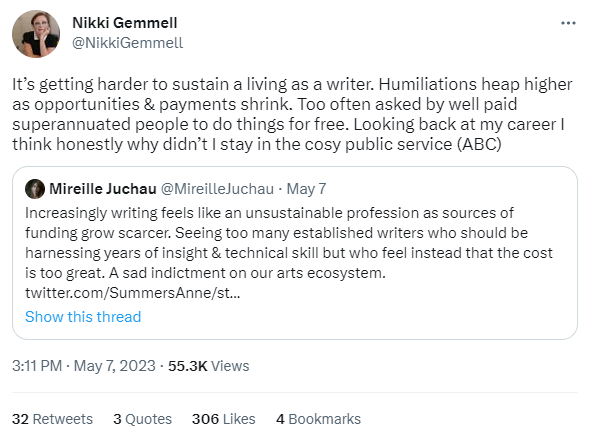Flourish
Or, why governments should fund the arts.

It’s Budget Week down in here in Australia and there are all sorts of conversations going on: Will the government spending increase inflation? Will $2.85 more per day be anywhere near enough money to pull those on unemployment benefits out of poverty? And what about the environment? Are we doing enough?
One aspect of the budget that stood out is that nearly $950 million will be invested in the arts over the next four years. This, of course, pales in comparison to the $368 billion earmarked for submarines. But it’s better than the 2021 budget when just $222 million was allocated to the arts.
The additional money is destined to:
- fix up some of the cultural institutions that have been neglected over recent years, like the National Library and the National Gallery of Australia (where water leaks have put priceless collections at risk)
- properly fund Trove, the National Library’s awesome online database
- establish some new arts organisations, including Creative Australia, Music Australia, Writers Australia and a Creative Workplaces centre
- establish a new body for First Nations Art, led by First Nations people
- improve training in the arts
- attract international investment into filmmaking
- improve authors’ incomes.
The last point is my favourite but I’m curious: How will they improve incomes for authors? Through fellowships? Prizes? Perhaps.
Anwen Crawford writes extensively about author income in her zine, Decorum Serves the Rich. Crawford talks about the ways that writers cobble together a living and still find time to write. She’s an accomplished writer, having had two books published and having received several grants, fellowships and prizes. Here’s what she says:
‘I’m one of those sad freaks who wanted to be a writer as soon as I could hold a pencil but at this stage of my life I have stopped dreaming that I will earn a full-time living from it.’
There’s regular commentary on Twitter about this topic, with successful Australian author Nikki Gemmel recently chiming in:

Gemmel’s tweet made me think: What if, 20 or more years ago, she’d stayed at the ABC and had not written her trail-blazing novel The Bride Stripped Bare? Would she have given up on the dream completely and later looked back over her life, wondering what it would have been like if she’d chosen to be a writer instead of staying in the ‘cosy’ public service? Maybe she could have found time to write in the evenings and on weekends. Or she could have risen at 4.30 am as so many writers do, getting their creative pursuits out of the way before they head to work for the day. At least she would have had a decent pay packet. But would she have had time to create such a formative piece of work?
Crawford writes:
‘The thing that all of us need – not just writers but everyone, everywhere – is some uninterrupted, unmeasured, “unproductive” time.’
Will the new government funding provide that kind of time? No doubt to a lucky few. I imagine the competition for the potential grants and prizes will be fierce.
Is it the government’s role to pay for all this arty stuff? Or is this a pull-yourself-up-by-the-bootstraps kind of world, fuelled by neo-Liberalism, where art is a bonus that the rich get to pursue? Crawford certainly thinks it is:
‘The authors who can spend their all their time writing books are – with exceptions like yr gazillion-selling Stephen Kings – still people who arrive at authorship with pre-existing wealth, in part because this wealth has bought them time to write in the first place.’
These days, I have some time to create. But a few years ago, I didn’t have time to read books – you know, one of the greatest passions of my life. I was so busy with my work and family stuff that I just couldn’t fit it in. In my day job, I was up to my neck in government reports, human resources, spreadsheets and dashboards. In my second shift, I was making lunches and cleaning things and reading emails about excursions and all the administrative stuff that no one warns you will suck the joy out of your life while your kids are at school.
I may have read a few self-help books along the way (how to grow a business, how to lead, how to be a good parent, that kind of thing). But classic or even contemporary literature seemed like they belonged in other worlds, inhabited by people who lived spacious lives with time to think and read. I don’t regret a minute of working as hard as I did. But I’m sad I stopped reading during that time. There are just way too many books to read in one lifetime as it is, without pausing for several years.
It's a finite thing, this time that we have on the planet. And, with free will, we get to choose how we spend it. I think so many of us would spend more of this precious time on creative pursuits if we could. Making a living gets in the way. And making a living from art is a hard game to play.
Despite all of this, artists will continue to create.
American actress Stella Adler said:
‘Life beats down and crushes the soul and art reminds you that you have one.’
For so many of us, our soul leads us toward art – a hobby perhaps, or a passion, maybe a vocation. Some of us will write; others will paint or sculpt or make films or poems or music or gardens or software or textiles or businesses. We do this because art remains the best way to convey the truth of ourselves. Art is a version of ourselves that we can share in order to tell others what it’s like to be us.
When we release the voices of our souls into the collective in the form of art, we foster connection. We see each other. We feel empathy. We exercise our curious minds. We learn from those who came before us. And we preserve our human experience for those who come next.
This is why governments should fund this arty stuff. Art is an essential ingredient of societal and individual flourishing. It has a perpetual meaning beyond capitalism, toil, taxes and death. We are humans who have souls and we need to be reminded of that.
It’s my genuine hope that the new funding offers new opportunities to emerging and established creators across this fine country. May more people use it to buy more time to create. And may Crawford and Gemmel continue to write, sharing a unique version of themselves so that we may know them too.

